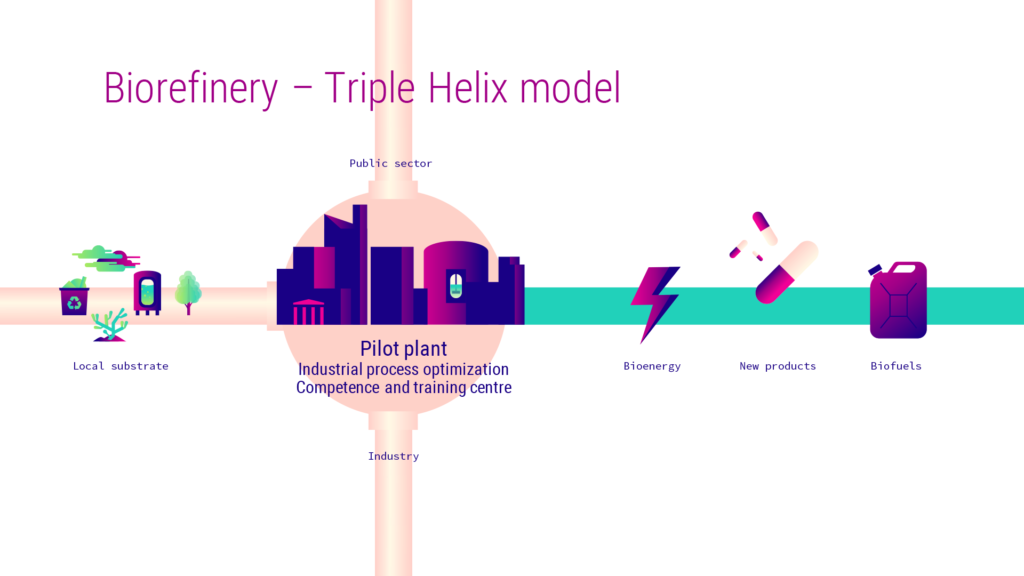New research direction on gas fermentation and research and innovation strategy
The research strategy will be focused on gasified biomass, waste, or industrial waste gaseous stream utilization to reach a goal of making the regional economy biosustainable. Because the energy and chemical industry in Estonia is dependent on oil shale, our mission is to introduce alternative C1 substrates. The main pillars of this research and innovation strategy will be refined by the ERA Chair holder, and will take the following starting point:
- Bring in the international research connections to foster excellence in gas fermentation technology research;
- Set up a state-of-the-art gas fermentation lab-scale facility;
- Investigate different local waste streams as feedstocks for gas fermentation;
- Implement high-throughput analytical and bioinformatics methods for the characterization of gas fermentation processes;
- Establish synthetic biology tools for the genetic and metabolic engineering of gas-fermenting acetogens through systems biology.
Structural changes at ECSB – The pilot plant for microbial cell factories
In line with the longer-term strategy for the ECSB, the GasFermTEC project includes the necessary measures to complete the design and planning of the pilot plant for the industrial scale-up of microbial cell factory technologies – which will increase the technology valorisation and innovation performance of the centre.
The role of the ERA Chair will be to coordinate the development of the pilot plant concept, business plan, technical blueprint, and marketing strategy. The results of this work will yield a solid plan for investment proposition for government and ECSB-Industry Association.
The pilot plant will offer access to state-of-the-art infrastructure to companies and research labs who intend to study, optimize or scale up their bioprocessing technologies. This core fermentation facility will enable the ECB to become a frontrunner in industrial biotechnology and to deliver a significant contribution to the European Research Area – stimulating economic growth both in and far beyond Estonia. The pilot plant will have the capacity to perform: i) Gas fermentation, ii) Lignocellulosic and other sugar-based waste stream biomass fermentation, iii) Biomass pre-treatment, iv) Downstream processing. The ERA Chair will lead the effort to design the facility to combine the capacity for both sugar and gas fermentation to become a testing ground for the synergistic combination of these sustainable technologies for both regional and global bio-based industries.
The pilot plant will also serve as a regional competence and training centre to foster bio-based industry and biosustainability. It will serve as a training centre for bioprocess operators and as a knowledge sharing platform to optimize and adjust the technologies to versatile forms of local biomass. The ECB Pilot Plant will enable new models of industry engagement, assisting companies with the scale-up of laboratory processes into industrially viable technologies with the aim of producing bio-based chemicals such as bio-chemicals, biomaterials, pharmaceuticals, bioplastics, bio-detergents, and bio-solvents. The innovations researched by the partner companies will get closer to market and thereby resulting in the creation of effective value for industry, environment, and society, and creating new jobs.
Structural changes – the ECBS-Industrial Association
The GasFermTEC ERA Chair project will develop new models for interaction between industry and academy. For this, the ERA Chair will coordinate the creation of an ECBS-Industrial Association as a new form of public-private partnership (PPP). As only very large companies can afford to build a bioprocessing pilot plant and keep the team of scientist around it, the initiative would serve as a collective project providing access to companies of various levels. The structural change will be performed on the basis to a “Triple Helix Model for Biorefineries” relying on three inputs: investment from public funds, investment from indus-try and local biomass as a resource.
The long-term vision and goals of the ECSB-Industry Association
- The ECSB-Industry Association will be a creative scientific hub and a leading regional cluster for development and commercialization of biorefinery processes, green products, chemicals, and materials.
- Integration into international collaboration networks of other pilot facilities, bioprocessing companies, and universities.
- Become the hub of a regional research network that links new ideas with companies and academia.
- Spread the vision of biosustainability via bioeconomy for a new generation through activities at dif-ferent schools. This offers possibilities for inspiration, education, short-term projects, and visits.
- A unique collaboration scheme to serve as a model for other competence centres and local industries
- Conduct highly respected courses and drive public debate towards building a sustainable future.
